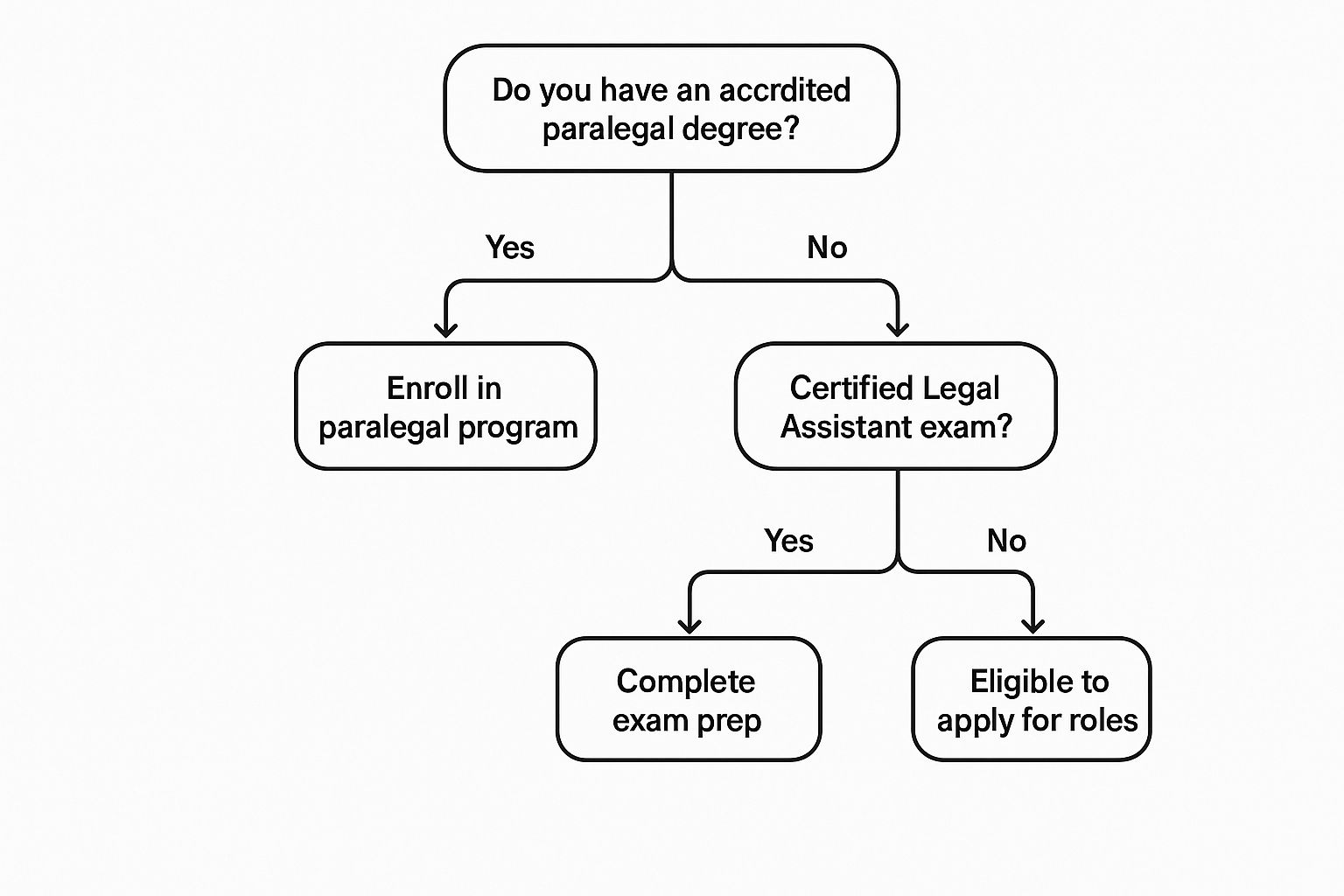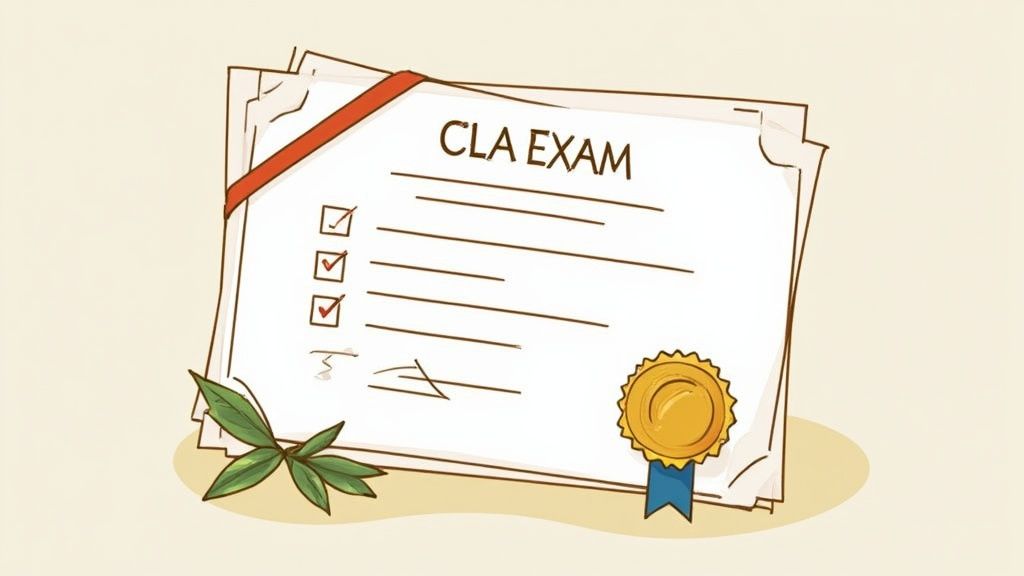
 22 minutes read
22 minutes read
Thinking about a paralegal career in California? Let’s get one thing straight: this isn't some fly-by-night gig you can just jump into. The Golden State has specific, non-negotiable rules under Business and Professions Code §6450, and ignoring them is a career-killer before you even get your business cards printed.
So, you want to be a paralegal in California. Fantastic choice. But before you dive in, we need to have a little chat. This isn't Texas or Florida, where the rules can be a bit more… let's call it relaxed. California is the only state that formally regulates the paralegal profession, and trust me, they don't mess around.

This isn’t just bureaucratic red tape for the sake of it. The state legislature put these laws in place to protect the public from someone who watched a season of Suits and thinks they can draft a motion. It’s a way to guarantee that anyone calling themselves a "paralegal" actually has the training and knowledge to back it up. In a field where one misplaced comma can have massive consequences, this standard of quality is everything.
Everything you need to know circles back to one critical piece of legislation: California Business and Professions Code §6450. Consider this your new bible. It lays out the official definition of a paralegal, what they can (and absolutely can't) do, and—most importantly—the qualifications you must have to legally use that title.
Think of it as the bouncer at the door of the profession.

Under California law, a paralegal is defined as a person qualified by education, training, or work experience who performs substantive legal work under the direct supervision of a licensed attorney. You can't just hang out a shingle and start poaching clients.
This means you’re not an independent contractor free to roam the legal plains. You are an extension of an attorney, and the state holds both you and your supervising attorney accountable. The code is crystal clear: you cannot give legal advice, represent clients in court, or set legal fees. Your job is to support, not to practice law. Blurring that line is a fast track to a world of trouble you do not want.
For a detailed look into what firms are actually looking for, check out this overview of https://hireparalegals.com/california/.
Before you even think about applying to a paralegal program, you need to internalize this: meeting the paralegal requirements in California isn't a friendly suggestion—it's the law. The state offers a few different pathways to get there, whether through a formal degree or a specific blend of education and hands-on experience.
You can't "wing it" here. Your entire journey starts with understanding these foundational rules. Let's break down the different paths you can take, but for now, just remember that California demands proof of your qualifications. This isn't just about landing a job; it's about earning the right to join a regulated and respected profession.
Here’s a quick rundown of what you absolutely must have to get in the game.
| Requirement Category | What You Absolutely Need |
|---|---|
| Education or Experience | Must meet one of the state-approved pathways combining education and/or work experience. No exceptions. |
| Attorney Supervision | Can only perform legal work under the direct supervision of a licensed California attorney. Period. |
| Continuing Legal Education | Must complete 4 hours of mandatory continuing legal education (MCLE) in legal ethics every 2 years. |
| More Continuing Education | Must complete 4 hours of MCLE in either general law or a specialized area of law every 2 years. |
| Title Usage | Cannot use the title "paralegal" unless all BPC §6450 requirements are met. Don't even think about it. |
Meeting these standards is the bare minimum. They are the ticket to entry for a long and successful career as a paralegal in the Golden State.
So, you’re ready to become a paralegal in California. The state is pretty specific about how you get there, and it's all laid out in the Business and Professions Code §6450. This isn't a set of suggestions; it's the law. It gives you four distinct routes to qualify.
But here’s the thing: not all roads lead to the same destination. Some are direct, well-paved highways that get you to a great job quickly. Others are more like winding country roads—they’ll get you there eventually, but they require a lot more time, effort, and maybe a bit of luck. Let's break down these four paths so you can choose the one that actually fits your life, not just the one that sounds easiest on paper.
At its core, California wants to ensure every paralegal has a solid foundation of legal knowledge and skills. They're not picky about how you get it, as long as you can prove you've got what it takes through one of these four routes.
The ABA-Approved Program: This is the gold standard. You complete a paralegal program that’s officially approved by the American Bar Association (ABA). It’s the most straightforward and widely respected path, leaving zero room for doubt about your qualifications.
The Accredited College Program: You can also earn a degree or certificate from an accredited college or university. The catch? Your program must include at least 24 semester units of substantive law courses.
The Bachelor's Degree + Experience: Already have a bachelor's degree in… well, anything? You can qualify with one year of law-related experience. This work has to be done under the supervision of a California attorney, who must then sign a declaration confirming your competence.
The "On-the-Job" Experience Path: This option is for those without a college degree. It requires a high school diploma or GED, plus a minimum of three years of law-related experience under an attorney's supervision, complete with the same signed declaration.
Figuring out where you fit in is the first crucial step. This chart can help you visualize the initial decision-making process based on your current education and work history.

As you can see, your starting point really dictates your next move. You'll either head toward a formal education program or focus on getting the right kind of experience to meet the state's tough standards.
Okay, so which path is best? Let me be blunt. If you're starting from scratch, the ABA-approved program is a no-brainer. That ABA stamp of approval is something hiring managers immediately recognize and trust. You graduate, you're qualified, and you're ready to start applying for jobs. Simple.
The other paths are perfectly legitimate, but they come with some serious strings attached.

The experience-based routes sound tempting, right? No tuition fees! But finding an attorney who will let you work under their supervision for one to three years—and then sign a legal document staking their professional reputation on your skills—is like finding a unicorn.
This isn't a small favor to ask. It’s a huge professional commitment from the attorney. That’s why these "experience" paths usually only work for people already in a law firm—like a legal secretary or assistant—who are looking to level up. If you're trying to break in from the outside, it's a much, much harder sell.
Now, if you already have a bachelor's degree, the post-baccalaureate certificate from an ABA-approved program is your golden ticket. It's focused, it’s fast, and it gives you that all-important credential that opens doors. It’s hands-down the most efficient way to pivot into the legal world. You can learn more about what the job is really like if you work as a paralegal in our detailed guide.
Ultimately, the right choice is yours. But don't mistake the "experience" path for an easy shortcut. More often than not, investing your time and money in a high-quality education is the fastest and most reliable road to a long and successful career.
Let's clear this up, because half the internet gets it wrong. In the legal world, a "certificate" from a school and a "certification" from a national exam are two wildly different beasts. Hope you enjoy semantics, because in California, this distinction is everything.

Confusing them is like mixing up the LSAT and the DMV test—both involve filling in bubbles, but only one gets you into law school. For aspiring paralegals here, understanding this difference is critical to meeting the state's strict requirements.
When California’s Business and Professions Code §6450 talks about qualifications, it’s laser-focused on your education. One of the main ways to meet the state's demands is by earning a certificate of completion from a paralegal program.
Think of this certificate as your diploma. It’s the piece of paper a college or university gives you to prove you successfully finished their program. It says you put in the classroom hours, studied substantive law, and didn't fall asleep during Civil Procedure.

This isn't just a suggestion. It's the state-mandated proof that you have the foundational knowledge to do the job without becoming a liability to your supervising attorney. In California, education isn't optional; it's the price of admission.
This educational certificate is what gets your foot in the door. Without it (or one of the other state-approved education/experience pathways), you legally cannot call yourself a paralegal in California. It's non-negotiable.
Now, let's talk about certification. This is a completely different animal. Certification is a voluntary credential you earn by passing a rigorous national exam given by a professional organization.
It’s like getting an advanced-level driving certification after you already have your license. You don't need it to drive, but it proves you have a higher level of skill and dedication.
The big players in the certification game are:
Passing one of these exams is no joke. It signals to employers that you’ve mastered a national standard of paralegal competency, which goes far beyond your school’s curriculum. Our complete guide to paralegal certification requirements breaks down what each exam entails.
Here’s the unfiltered truth: in California, the educational certificate is mandatory to meet the legal requirements. The national certification is your competitive advantage. You must have the first one; you should seriously consider the second.
Why? Because when a hiring manager has two resumes side-by-side from graduates of the same ABA-approved program, the one with the "CP" or "PP" designation often gets the interview. It’s a powerful tiebreaker.
This isn’t just my opinion—it’s reflected in hiring trends. The educational certificate is the baseline, but a voluntary certification from groups like NALA validates your expertise and can lead to better job offers and higher pay. In short, California employers value education so much that nearly all require at least a certificate just to consider you.
So, is that extra credential a smart career move or just an expensive line on your resume? If you want to stand out in a crowded market, it’s one of the best investments you can make. The certificate makes you qualified; the certification makes you compelling.
Alright, you’ve picked a path—now for the hard part. You're about to dive into a sea of college websites, each one promising it’s the absolute best place to launch your legal career. Hope you enjoy spending your afternoons fact-checking marketing claims, because that's now your part-time job.

This isn’t a decision to take lightly. Choosing the wrong program isn't just a waste of money; it's a career detour that can cost you precious time and momentum. Let’s cut through the noise and focus on what actually matters to the hiring managers who will one day be signing your paychecks.
Let's get straight to the point. As you start vetting programs, the first and most critical question you should ask is this: "Is this program approved by the American Bar Association (ABA)?" If the answer is no, you need a very compelling reason to keep it on your list.
ABA approval is the gold standard for paralegal education, full stop. It signifies that the program has been put through the wringer—its curriculum, faculty, and resources have all been scrutinized and found to meet the highest national standards. For law firms and corporate legal departments, it’s a powerful signal that you’ve received a serious, substantive education.

Think of ABA approval as a pre-vetted credential. It tells a potential employer that you didn't just get a degree from some online diploma mill; you graduated from a program that instills the practical, real-world skills they desperately need. It’s the closest thing to a quality guarantee in this industry.
Opting for a non-approved program is a gamble. Can you still land a job? Perhaps. But you're starting the race with a handicap, and in a competitive market like California, that's just making things harder on yourself.
Once you've narrowed your search to ABA-approved options, you need to decide on the venue. Each has its own distinct flavor, and what works perfectly for a recent high school grad might not be a fit for a mid-career professional looking for a change.
Ultimately, the format is less important than the quality of the education and that ABA stamp of approval. Your goal is to earn a qualification that meets the strict paralegal requirements in California, and an ABA-approved program is your most direct route.
This isn't just an academic distinction; it's a choice with real, long-term career implications. Here’s a head-to-head comparison to help you understand what's at stake.
| Feature | ABA-Approved Program | Non-Approved Program |
|---|---|---|
| Hiring Preference | Highly preferred by top law firms and corporations. | Often overlooked; may require extra effort to prove skills. |
| Curriculum Standard | Meets rigorous national standards for legal education. | Varies wildly; quality can be inconsistent and unvetted. |
| Credit Transferability | Credits are more likely to be accepted by other institutions. | May not be transferable, potentially locking you in. |
| Career Mobility | Opens doors to a wider range of opportunities and states. | Can limit your options, especially with larger employers. |
When you start talking to admissions counselors, go beyond the tuition figures. Ask about their job placement rates, their internship connections, and the strength of their alumni network. You want to invest in a program that invests in your future career, not one that just sells you a piece of paper.
So you’ve done it. You jumped through all the hoops, finished your schooling, and officially earned the title of California paralegal. Now you can finally relax, right? Not so fast.
Think of your paralegal qualification not as a finish line, but as a subscription service you have to renew. In California, legal education isn't a "one and done" deal. The state expects you to stay on top of your game, and they've built a system to make sure you do.
This brings us to the world of Mandatory Continuing Legal Education (MCLE). This isn't a polite suggestion—it's a strict requirement woven into the fabric of California's paralegal regulations. If you let it slide, you could lose your right to work as a paralegal in the state. The stakes are that high.
So what does this actually involve? Every two years, you’re required to complete a set number of educational hours. And it’s not just about filling a quota with any random webinar; California has specific rules about what you study.

The state requires eight hours of MCLE every two-year cycle. Four of those hours must be focused on legal ethics, while the other four can be in general law or a specialty practice area. This setup is designed to keep you both professionally competent and ethically sound.
This isn't just bureaucracy. It's a system designed to protect the public, your supervising attorney, and your own career from mistakes that could arise from outdated knowledge. The legal world is constantly shifting, and what was best practice a couple of years ago might be a serious liability today.
I know what you're thinking: more mandatory training feels like a drag. But viewing MCLE as just another box to check is a huge missed opportunity. Think of it as a state-sponsored reason to become more valuable and essential to your team.
Instead of just finding the quickest online ethics course, be strategic. Use these required hours to develop expertise in a niche area that benefits your firm.
Here's how to turn this obligation into an opportunity:
Staying compliant is the bare minimum. While California mandates 4 hours of legal education every two years for ethics and 4 hours for other legal topics, the best paralegals use this as a springboard for growth. This framework keeps you current and makes you a far more effective member of any legal team. To see how continuing education fits into the bigger picture, you can find more insights on becoming a paralegal.
Don't just meet the requirements—master them. This is your chance to build your reputation, sharpen your skills, and prove you’re not just a paralegal, but a key player in your firm’s success.
Alright, enough theory. Information is useless without a plan, so let’s get down to brass tacks. We're going to break down the entire process into a clear, step-by-step roadmap to get you from where you are now to your first day as a qualified California paralegal.
Think of this as your personal game plan. No fluff, just the essential moves you need to make to navigate the state’s requirements successfully.
This is where you set the stage for everything that follows. These early choices will shape the next few years of your career, so take your time and get them right.
Start with an Honest Self-Assessment: First things first, take a hard look at where you stand. Do you already have a bachelor's degree? Are you currently working in a legal setting? Your starting point determines your path. Be realistic about your budget, your timeline, and how much you can truly commit.
Choose Your Qualification Path: Based on that assessment, it's time to pick your route. If you have a B.A., a post-baccalaureate certificate is easily the fastest track. If you're starting from scratch, an ABA-approved associate's or bachelor's degree is your most reliable bet. As for the "experience-only" option? I’d steer clear unless you already have an attorney who has guaranteed they will sponsor and supervise you.
Vet Your Educational Program: Now the real homework begins. Find at least three ABA-approved programs and dig deep. Get on the phone with them. Ask pointed questions about their job placement rates, how they support students with internships, and the strength of their alumni network. Treat this like a major investment, because it is.
This phase is all about the grind. It’s time to put your head down and do the work that will make you a valuable professional.

The real objective isn't just to scrape by and meet the minimum paralegal requirements in California. The goal is to become so skilled and qualified that law firms are actively competing to hire you. Your educational certificate gets you in the door; tangible skills and a national certification will get you the job you actually want.
Finally, the moment you land your first paralegal role, mark your first MCLE reporting deadline on your calendar. Don’t be that person scrambling to find 8 hours of courses at the last minute. Stay ahead of your compliance, keep learning, and continuously build your value in the field.
Alright, let's dive into some of the most common questions I hear about becoming a paralegal in California. These are the things people ask time and time again, so let's clear the air and get you some straight answers.
The short answer is a hard no. I've seen incredibly skilled legal assistants with decades of experience ask this, and the answer, unfortunately, is always the same. California law is crystal clear on this point.
While that hands-on experience is invaluable and will make you a fantastic paralegal, it doesn't replace the formal education required. You absolutely must meet one of the specific educational pathways outlined in Business and Professions Code §6450. There's simply no "experience-only" route to qualification in this state.
This really boils down to where you're starting from. There isn't a one-size-fits-all timeline.
If you already have a bachelor's degree in any field, you're on the fast track. You can complete an ABA-approved paralegal certificate program in as little as 9-12 months. If you're starting from scratch, you'll be looking at the standard two years for an associate's degree or four years for a bachelor's degree in paralegal studies.
This is a point of confusion for many, so let's get the terminology right. Paralegals in California are not licensed in the way attorneys are. There's no "paralegal bar exam" to pass.
Instead, the profession is regulated. The state sets strict minimum standards for education and ongoing training that you must meet to legally call yourself a paralegal. Think of it as being qualified under state law, not licensed to practice independently.

It's a critical distinction. You're not an independent practitioner; you're a highly regulated professional who must work under the direct supervision of a licensed attorney. The state's goal is to ensure you have the proven knowledge to do the job correctly.
Technically, no, it's not the only option available under the code. But let me be frank: choosing a non-ABA-approved program can be a major handicap for your career.
Graduating from an ABA-approved program is the gold standard and the most direct and respected path. Many top-tier law firms and corporate legal departments prioritize—or even exclusively hire—candidates from these programs. It gives you a significant competitive advantage and is the closest thing to a "sure bet" for opening doors in the legal field.
Finding talent that meets California's rigorous standards can feel like a full-time job in itself. HireParalegals eliminates the guesswork by connecting you with pre-vetted, experienced remote paralegals, often within 24 hours. Stop sifting through endless resumes and start interviewing qualified candidates by visiting HireParalegals.com.